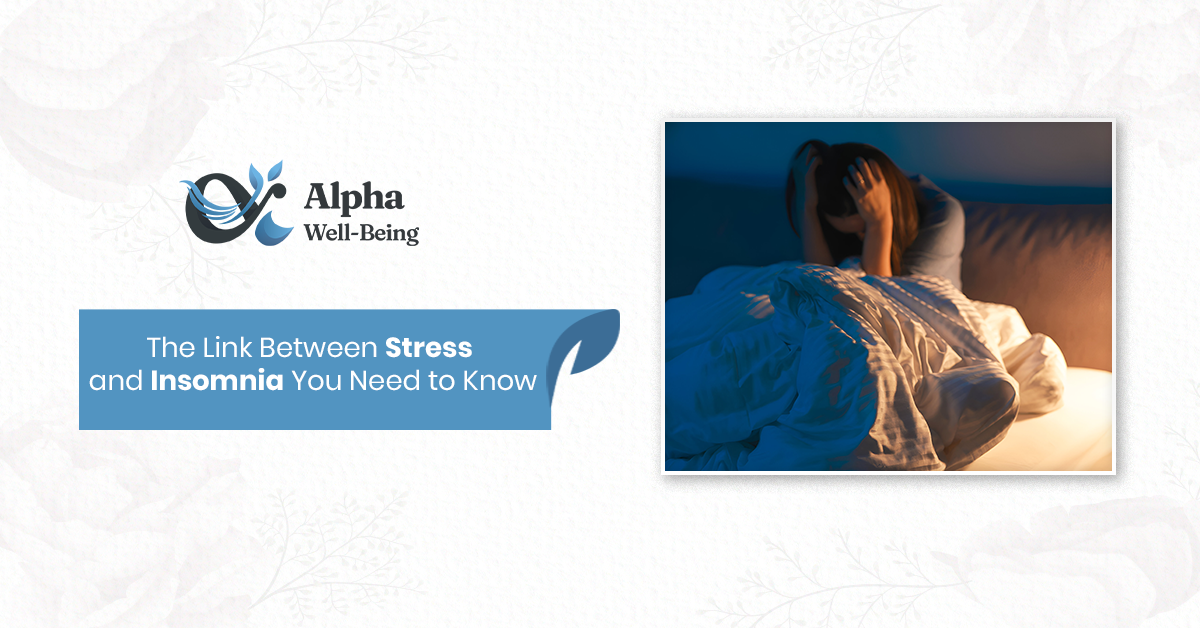It’s somehow contemporary to lie awake at 2 AM, planning out your emails, although your body wishes to sleep.
If you can relate to the struggle between fatigue and staying awake, you face one of the biggest health challenges today.
While stress used to help us sleep when needed, it now causes sleep issues that often harm our health.
Comprehending this link will help you begin to restore your sleep and your strength.
The Link Between Stress and Insomnia
Your nervous system operates with remarkable precision, but it hasn’t quite caught up to what modern life involves.
Fight-or-flight activation from stress triggers your body to release cortisol and adrenaline, which keep you on high alert.
In the past, this reaction kept people alive when they faced swift physical danger.
At present, your body treats looming deadlines with the same urgency as it would a real emergency.
Consider your nervous system as something that slowly dims during the evening, helping you prepare for bed.
Chronic stress takes over your regular cycle, leading to extra stimulating hormones when your body needs to relax.
Not sleeping enough makes it much harder to deal with stress.
When you don’t get enough sleep, your prefrontal cortex doesn’t function well, resulting in extra stress and poor-quality sleep.
Related: Is Insomnia Treatable?
The Physiological Impact of Stress on Sleep
If stress hormones are released at night, your body will react in ways that make it challenging to fall asleep.
- Elevated core body temperature: Dropping your core temperature is essential for good sleep, but feelings of stress push it up instead
- Increased cardiovascular activity: As a result, your heart continues to pump blood vigorously, missing the calm it needs for a good night’s sleep
- Heightened muscle tension: Stress leads to stiff muscles that stop the body from relaxing automatically
- Neurotransmitter disruption: Emotional stress disrupts the levels of GABA and melatonin, which are chemicals that help you sleep
They not only affect your sleep speed but also split your sleep cycle, reducing your amount of deep sleep and REM time.
The Cognitive Loop That Perpetuates Sleeplessness
Besides the obvious problems of rest, stress makes our minds more difficult by making sleep even harder. With a decreased flow of external information, thoughts in our mind often become louder, causing sleep researchers to describe this as “cognitive arousal.”
This manifests as:
- Racing thoughts about unresolved issues
- Excessive worry ahead of important events
- Remembering and reviewing events from the past
- Being hypervigilant about what could go wrong if sleep is missed
You often find that the more tired you get, the harder it is to sleep.
When suffering from performance anxiety about sleep, your bedroom can become a place you avoid instead of one you seek comfort in.
Evidence-Based Strategies for Breaking the Cycle
Addressing stress-related insomnia requires a multifaceted approach that targets both the physiological and psychological components of the problem.
Optimize Your Sleep Environment
Make your bedroom comfortable for sleeping, so it encourages you to relax and unwind:
- Maintain a cool temperature between 65-68°F
- Eliminate light sources or use blackout curtains
- Consider white noise or earplugs to minimize disruptions
- Reserve your bed exclusively for sleep
Implement a Strategic Wind-Down Routine
Use about 60-90 minutes before bed to calm yourself down. It’s not essential to be perfect—you only need to be consistent.
- Turn off the bright house lights and instead use warm, dim ones
- Choose to calm yourself by reading, doing light stretches, or writing in a journal
- Avoid your screens for 1-2 hours before going to sleep
- A warm bath can lower your temperature and make you feel tired, which encourages sleepiness
Focused Breathing
Using specific breathing exercises can calm your body by reducing stress and getting your body into a rest state:
- 4-7-8 breathing: Inhale for 4 counts, hold for 7, exhale for 8
- Box breathing: Inhale for 4, hold for 4, exhale for 4, hold for 4
- Extended exhale: Make your exhale twice as long as your inhale
Practice Strategic Worry Management
Transform middle-of-the-night anxiety into actionable steps:
- Keep a worry journal by your bed for racing thoughts
- Designate a specific “worry time” earlier in the day
- Use the “parking lot” technique—write down concerns to address tomorrow
- Show yourself kindness whenever you have a hard time sleeping
Advanced Interventions Worth Considering
Sometimes self-care strategies need professional support to be truly effective.
Cognitive Behavioral Therapy for Insomnia
CBT-I helps you fight sleep issues by identifying and dealing with the thoughts and behaviors causing insomnia.
CBT-I is shown by research to be effective for treating insomnia as compared with medications.
Mindfulness-Based Stress Reduction
This specialized program was made to teach you practical meditation methods to help lessen your stress and enhance your sleep.
Sleep Studies and Medical Evaluation
If your sleeplessness due to stress keeps happening, ask your doctor about sleep studies and tests for hormonal problems.
To Conclude
Stress often leads to sleep problems, yet realizing this helps us find solutions.
Not being able to sleep through the night isn’t your doing—it happens because you have too much to think about.
It takes time and effort to fix sleep problems. It is all about slowly helping your body learn to relax and your mind calm down.
This process takes patience, regular effort, and occasionally the guidance of a specialist.
Long-term success comes from methods you can keep up, not those that demand huge and unusual sacrifices.
Gradual improvements in relaxing and sleeping can add up to a much healthier life.
When you prioritize sleep, you do the right thing, not something wrong. Quality sleep helps your immune system, mood, and mental abilities.
Get Support at Alpha Wellbeing Care
We know at Alpha Wellbeing Care that treating stress and sleep problems requires professional expertise and is best done through personalized attention.
We combine therapies based on research with wellness techniques chosen for you as an individual.
Make an appointment with Alpha Wellbeing Care today.
FAQs
How quickly can I expect to see improvements in my sleep when addressing stress?
Not everyone’s progress is the same, but most people start noticing positive changes about 2-3 weeks after sticking with stress management activities.
Stable changes in how someone sleeps usually develop over six to eight weeks.
How does exercise affect someone with sleep problems caused by stress?
Being active in exercise regularly may cut down on stress and boost your sleep.
It clears stress hormones from your body, helps you release endorphins, and makes you sleep more soundly. Though, exercising before going to bed may wake you up.
Why do I tend to wake up around 2 and 4 AM when I’m feeling stressed?
At this point, the body’s cortisol levels rise and fall as usual.
A hormone system can sometimes rouse you from bed when you are often under great pressure.
As the hours pass during the night, your body finds it harder and harder to fall back asleep.
If you have stress-related insomnia, should you give up caffeine?
In most cases, total elimination isn’t required, but knowing when to act matters most.
Don’t consume caffeinated foods or drinks after 2 PM because they take a long process. Feeling stressed often makes your body react more strongly to caffeine.



No comment